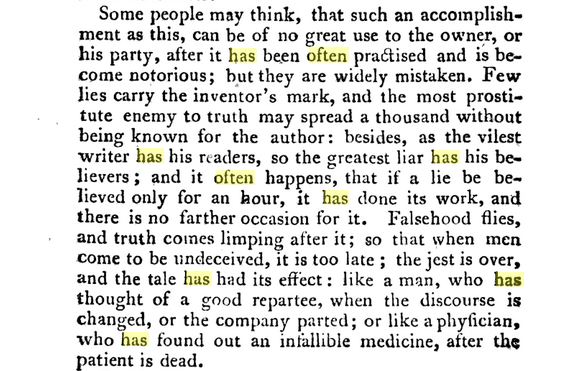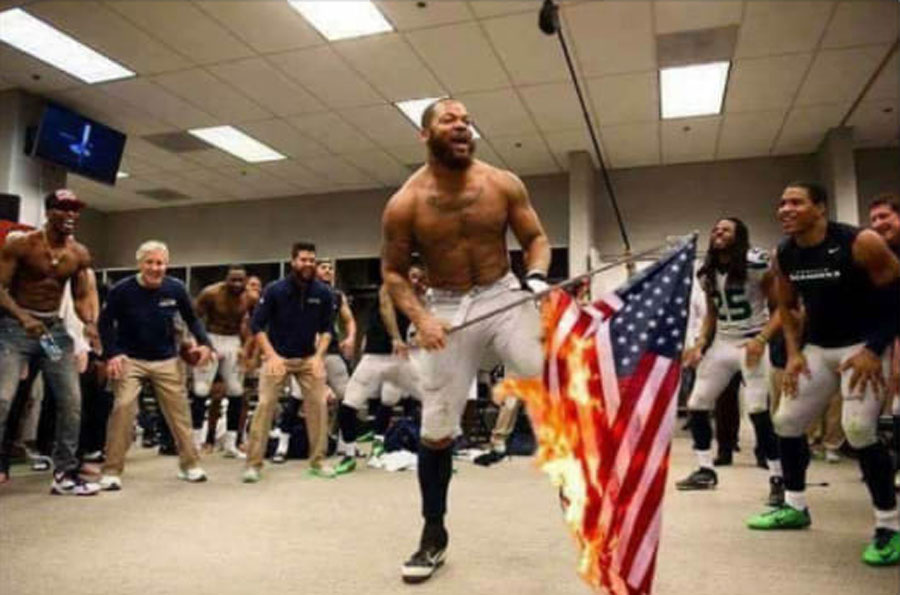The #takeaknee controversy starring some NFL players, their president and culture warriors of all stripes shows no sign of ending any time soon.

Unavoidably, fake news purveyors have indulged the temptation to throw some gasoline of their own on the fire that was already there.
1)
Did the Seattle Seahawks’ Michael Bennett burn the U.S. flag (under a sprinkler) as his teammates whooped in delight? No; the widely shared image above is a Photoshop job.
Here’s the original:
2)
LeBron James didn’t wear a shirt saying “We march, y’all mad. We sit down, y’all mad. We speak up, y’all mad. We die, y’all silent” last week; it’s a Photoshopped version of a shirt he wore in 2014 saying “I can’t breathe,” a reference to the last words of Eric Garner, who died that year after New York police put him in a chokehold. (In this case, it’s not clear what the point of the fake was supposed to be, since the fake and real shirts have similar political messages.)

3)
Did Oakland Raiders players punish Derek Carr for standing for the U.S. national anthem by letting him be tackled unnecessarily? It was a conservative radio talking point, but Carr himself disagreed.
4)
U.S. president Donald Trump didn’t sign an executive order taking away the NFL’s non-profit status; the photo was shot at an unrelated event by Reuters back in January. In any case, the AP points out, the league gave up its tax-exempt status in 2015. (Trump made statements this week implying he’s not aware of that, however.)
5)
Did the flight crew of a Boeing 737 (“combat-hardened American heroes”) carrying the New Orleans Saints ‘take a knee’ and abandon plane, players and all in the middle of a runway? You can probably guess the answer. The story has the authority-figure-humiliates-dissenter theme that we see over and over in fake news.
6)
Did the Pittsburgh Steelers fine players who skipped the anthem $1 million? You can probably guess the answer to that one, too. Politifact supplies some context: the original story came from thelastlineofdefense.org, a satirical liberal site that trolls conservatives, and was picked up uncritically. (The players are paid a lot by normal-people standards, but not so much that you can just start slapping them with million-dollar fines.)

Get daily National news
7)
Is Fox boycotting the NFL because of the protests? That’s what thelastlineofdefense.org reported, but then again they also say that they “present fiction as fact … if you believe this crap you’re a real dumbass.” That’s a very robust approach to full disclosure, but didn’t stop the story from being republished on a range of dubious sites, minus the disclaimer.
8)
Reports that Colin Kaepernick said he would stand for the anthem if he was signed by an NFL team were strongly denied by Kaepernick. The claim originally came from a CBS reporter who later retracted it. (Snopes explains the sequence of events in more detail).
h/t to Buzzfeed, Politifact and Snopes.
It was as he contradicted this report that Kaepernick quoted Winston Churchill as saying that “a lie gets halfway around the world before the truth has a chance to get its pants on.”
As it turns out, Churchill probably didn’t say this, or wasn’t first to; the version I learned was attributed to Mark Twain, and ended” … has a chance to put its boots on,” but Twain may not have said that either.
Kaepernick has the better version — the vision of truth frantically trying to put on its pants as a lie sails away over the horizon is irresistible.
But the fact that it’s much quicker (and far cheaper) to make up lies than to find out stubborn, complex truths is fundamental to the conflict between fake news and real journalism in our own time.
The original may have come from Jonathan Swift, a shrewd, caustic observer of human societies:

WATCH: U.S. President Donald Trump said that NFL team owners want to discipline football players kneeling during U.S. anthem but they’re too “afraid” of them during an Interview on Fox News’ Fox & Friends.

In fake news news:
- Buzzfeed calls U.S. congressional interest in the relationship between Russia, social media and the 2016 U.S. election “an unprecedented crisis for Facebook … with no end in sight.” Buzzfeed’s take: regulation is unavoidable, and Facebook’s only option is to try to influence its shape.
- Facebook deleted thousands of posts shared during the U.S. election as Jonathan Albright, a Columbia University researcher, tried to study them, Business Insider reports. Facebook says it was fixing a bug. “The deletion of the posts and the related data struck Albright as a major loss for the world’s understanding of the Russian campaign,” the Washington Post reports. Among other things, it seemed to show that far more people saw ads bought by Russian troll farms than originally thought.
- Congressional investigators are also taking an interest in the research firm Cambridge Analytica’s role in the 2016 campaign, the Daily Beast reports. The company says it has the ” … ability to tailor a specific message based on personality type – angry, fearful, optimistic and so forth.”
- A long read in the Columbia Journalism Review warns that we risk losing the function that traditional mass media have served for generations, providing a sense of a shared civic reality: ” … It’s easier than ever for news consumers to ensconce themselves in hermetically sealed information bubbles and ignore revelations that challenge their worldviews. For most people, “news” ceases to function as a means of enlightenment, and becomes fodder for vitriolic political debates that play out endlessly on social media … Inevitably, the rich and powerful — those who can afford to buy and bankroll their own personal Pravdas — benefit most in this brave new world.” It’s a vision as plausible as it is depressing.
- Catalan farmers epically trolled the Guardia Civil, the Spanish national police, earlier this month. Fed bad information through social media that nationalist farmers were going to block the French border with tractors, the Guardia Civil set out to stop them. Once there, the farmers trapped them at the border, where they couldn’t interfere with a general strike. Buzzfeed explains.
- When painted swastikas started to appear in Germany in 1959, some on synagogues, they rubbed raw wounds left from the Nazi period. The outbreak damaged relations between West Germany and its allies, which suspected it of not being the rehabilitated democracy it was hoped to be. Later, defectors revealed that it had been an ‘influence operation’ by the East German intelligence services. However, CNN points out, it takes two to tango: ” … influence operations … rely on the willingness of their targets to be duped or cajoled or simply nudged further in the same dangerous direction they were already heading.” The lesson for our own time — the cleverest propaganda plays on divisions that already exist.
- Following that thought, a New York Times analysis of posts by accounts based in Russia but posting as American played on divisive narratives that they had already observed on partisan pages in the U.S. “one of the most powerful weapons that Russian agents used to reshape American politics was the anger, passion and misinformation that real Americans were broadcasting across social media platforms.”
- The Washington Post analyzes a White House propaganda video (‘What the fake news media will not show you in Puerto Rico … ‘) about Puerto Rico relief efforts, calling it “selectively edited,” cutting out parts of an interview where a rescue worker from the mainland praised Puerto Ricans for work they had done clearing roads. (The full clip would have contradicted a presidential tweet complaining that Puerto Ricans “want everything to be done for them.”)
- Earlier this week, the Dow Jones newswire briefly amplified a fake news report that Google had bought Apple for US$9 billion. Trading bots, who didn’t know the report was fake, then started to buy Apple, bumping its stock price from US$156 to US$158.
- The Atlantic Council’s Digital Forensic Research Lab outlines how Russian and Russian-affiliated outlets and social media accounts spread fake news stories about the Las Vegas massacre. “Despite low engagement, this is a case study of how loosely Kremlin-aligned media outlets and Twitter users can be mobilized to spread hoaxes and conspiracy theories in the aftermath of a terrorist attack or a mass shooting to confuse and distort the facts,” DFR concludes.
- Google is investigating Russian-linked ad buys in 2016 on YouTube and Gmail, the Washington Post reports.
- And Russian-controlled accounts show a specific focus on supplying active-duty military members and veterans with “fake or slanted news,” an Oxford University study shows.
- Vox explains the role of the ‘illusory truth effect’ in fake news — as a claim is repeated, our resistance to it breaks down, regardless of its truth or falsity. Correction should help, but doesn’t: “When you see a news report that repeats the misinformation and then tries to correct it, you might have people remembering the misinformation because it’s really surprising and interesting, and not remembering the correction.”
- Vox’s story calls to mind the quote, in some form or other, that “a lie repeated enough times becomes the truth,” sometimes attributed to Lenin, Hitler or Goebbels. Perhaps ironically, the truth on this one is hard to pin down, but it may have come from a now-forgotten 19th-century author who observed that ” … If a lie is only printed often enough, it becomes a quasi-truth, and if such a truth is repeated often enough, it becomes an article of belief, a dogma, and men will die for it.”


_848x480_1397405763961.jpg?h=article-hero-560-keepratio&w=article-hero-small-keepratio&crop=1&quality=70&strip=all)



Comments